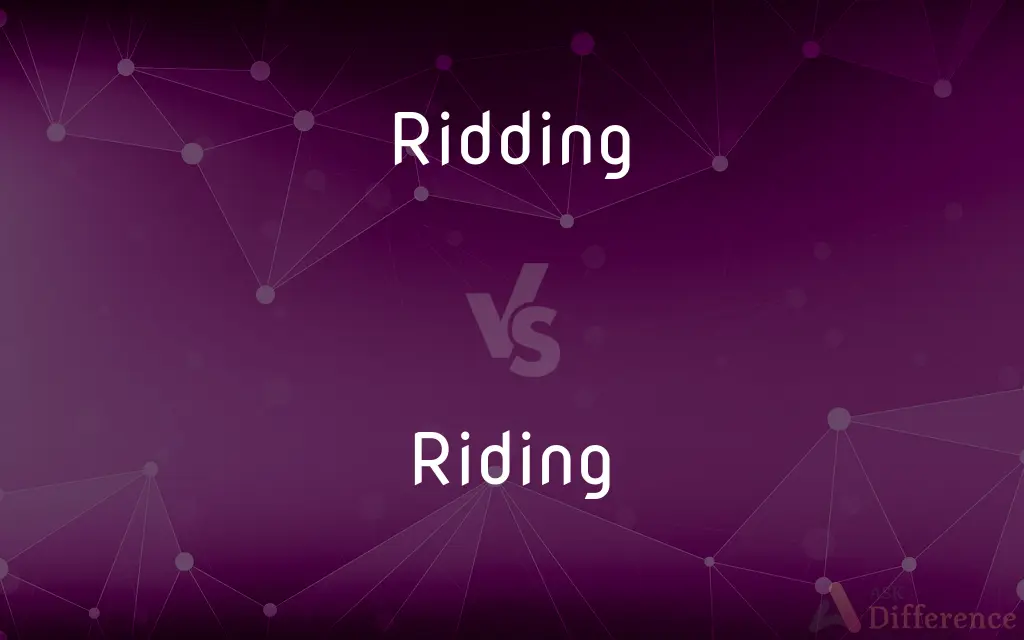Ridding vs. Riding — What's the Difference?
By Fiza Rafique & Urooj Arif — Updated on May 6, 2024
Ridding means eliminating or removing something undesirable, whereas riding involves sitting on and controlling a vehicle or animal.

Difference Between Ridding and Riding
Table of Contents
ADVERTISEMENT
Key Differences
Ridding involves the act of eliminating or clearing away, typically something unwanted or burdensome. Whereas riding refers to the act of being carried along by or controlling a vehicle, animal, or other conveyance.
Ridding is often used in contexts that emphasize removal, such as ridding a house of pests. On the other hand, riding is primarily associated with travel or recreation, such as riding a horse or bicycle.
Ridding a space of negativity can be metaphorical, signifying the act of making an environment more positive. While riding can also have metaphorical uses, like riding a wave of success, which implies taking advantage of an ongoing trend or situation.
Ridding is typically a deliberate action intended to cleanse or purify. Whereas riding suggests an ongoing action that requires balance and control, emphasizing movement and direction.
Ridding might involve various strategies or methods to eliminate the unwanted element effectively. In contrast, riding often requires specific skills or knowledge, such as knowing how to handle a horse or operate a motorcycle.
ADVERTISEMENT
Comparison Chart
Definition
Act of removing or eliminating something.
Act of traveling on or controlling an animal or vehicle.
Usage Context
Often negative, as it involves removing undesirables.
Mostly positive or neutral, related to travel or sport.
Associated With
Cleaning, purifying, eliminating.
Traveling, controlling, balancing.
Skills Required
Decision-making, problem-solving.
Physical balance, control, technique.
Example Objects
Pests, obstacles, burdens.
Horses, bikes, cars.
Compare with Definitions
Ridding
Eliminating unwanted elements.
She focused on ridding her garden of weeds.
Riding
Traveling by horse.
They went riding in the countryside this weekend.
Ridding
Freeing an area from contaminants.
The crew was tasked with ridding the water supply of pollutants.
Riding
Being carried on something.
The child enjoys riding on his father's shoulders.
Ridding
Clearing out unnecessary items.
He spent the weekend ridding his attic of old junk.
Riding
Participating in a mechanical ride.
They had fun riding the roller coaster at the amusement park.
Ridding
Disassociating from negative influences.
She committed to ridding her life of negativity.
Riding
Operating a bicycle.
She loves riding her bike through the park.
Ridding
Detaching or unburdening oneself.
He's ridding himself of all old debts.
Riding
Utilizing a vehicle for travel.
He's been riding the subway to work for years.
Ridding
Ridding is a surname, and may refer to:
Riding
The act of riding.
Ridding
To cause (someone) to be free from something; relieve or disencumber
He was finally able to rid himself of all financial worries.
Riding
Horseback riding.
Ridding
Present participle of rid
Riding
An administrative division or electoral division in Canada.
Riding
Any one of three former administrative divisions of Yorkshire, England.
Riding
The act or an instance of riding, as in a vehicle or on an animal.
Riding
A path made for riding on horseback, especially through woodlands.
Riding
A device, such as one at an amusement park, that one rides for pleasure or excitement.
Riding
A means of transportation
Waiting for her ride to come.
Riding
To be carried or conveyed, as in a vehicle or on horseback.
Riding
(Sports) To participate in a board sport such as snowboarding.
Riding
To travel over a surface
This car rides well.
Riding
To move by way of an intangible force or impetus; move as if on water
The President rode into office on a tide of discontent.
Riding
(Nautical) To lie at anchor
Battleships riding at the mouth of the estuary.
Riding
To seem to float
The moon was riding among the clouds.
Riding
To be sustained or supported on a pivot, axle, or other point.
Riding
To be contingent; depend
The final outcome rides on the results of the election.
Riding
To continue without interference
Let the matter ride.
Riding
To work or move from the proper place, especially on the body
Pants that ride up.
Riding
To sit on and control the movement of
Rode a motorcycle to town.
Ride a horse to the village.
Riding
(Sports) To glide or move while standing on or having one's feet attached to (a board, such as a snowboard).
Riding
To travel over, along, or through
Ride the highways.
Riding
To be supported or carried on
A swimmer riding the waves.
Riding
To take part in or do by riding
He rode his last race.
Riding
To cause to ride, especially to cause to be carried
The police rode him down to the station.
Riding
(Sports) To control (an opponent) in wrestling, usually by holding the opponent down.
Riding
(Nautical) To keep (a vessel) at anchor.
Riding
To tease or ridicule.
Riding
To harass with persistent carping and criticism.
Riding
To keep partially engaged by slightly depressing a pedal with the foot
Don't ride the clutch or the brakes.
Riding
Present participle of ride
Riding
A path cut through woodland.
Riding
The act of one who rides; a mounted excursion.
Riding
The behaviour in the motion of a vehicle, such as oscillation.
Riding
(obsolete) A festival procession.
Riding
(historical) Any of the three administrative divisions of Yorkshire and some other northern counties of England.
Riding
(Canada) Electoral district or constituency.
Riding
One of the three jurisdictions into which the county of York, in England, is divided; - formerly under the government of a reeve. They are called the North, the East, and the West, Riding.
Riding
The act or state of one who rides.
Riding
A festival procession.
When there any riding was in Cheap.
Riding
A district in charge of an excise officer.
Riding
Employed to travel; traveling; as, a riding clerk.
Riding
Used for riding on; as, a riding horse.
Riding
Used for riding, or when riding; devoted to riding; as, a riding whip; a riding habit; a riding day.
Riding
Riding a horse as a sport
Riding
Riding a horse as a means of transportation
Riding
Traveling by wheeled vehicle such as bicycle or automobile e.g.;
The riding public welcomed the new buses
Common Curiosities
Is ridding always a physical action?
No, ridding can be conceptual, such as ridding oneself of bad habits or thoughts.
What are some common forms of riding?
Common forms of riding include bicycling, horseback riding, and motorcycling.
What does ridding mean?
Ridding refers to the act of eliminating or removing something undesirable.
What skills are necessary for effective ridding?
Effective ridding requires skills like critical thinking and problem-solving.
Can ridding be used metaphorically?
Yes, ridding can be used metaphorically to describe eliminating non-physical entities like doubts or fears.
What are some safety concerns associated with riding?
Safety concerns with riding include accidents, falls, and collisions.
What does riding mean?
Riding involves being seated on and controlling a vehicle or animal.
What skills are essential for riding?
Skills like balance, physical coordination, and control are essential for riding.
How does the context of use differ between ridding and riding?
Ridding is often used in contexts involving removal or clearance, while riding is associated with travel and control.
Is ridding often considered a positive action?
Ridding is generally considered positive when it involves removing harmful or unwanted things.
Can riding be a professional activity?
Yes, riding can be professional, as in careers like jockeys or professional cyclists.
Share Your Discovery

Previous Comparison
Footprint vs. Fingerprint
Next Comparison
Theatre vs. VenueAuthor Spotlight
Written by
Fiza RafiqueFiza Rafique is a skilled content writer at AskDifference.com, where she meticulously refines and enhances written pieces. Drawing from her vast editorial expertise, Fiza ensures clarity, accuracy, and precision in every article. Passionate about language, she continually seeks to elevate the quality of content for readers worldwide.
Co-written by
Urooj ArifUrooj is a skilled content writer at Ask Difference, known for her exceptional ability to simplify complex topics into engaging and informative content. With a passion for research and a flair for clear, concise writing, she consistently delivers articles that resonate with our diverse audience.
















































